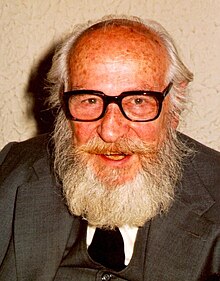Agustí Chalaux i de Subirà
Agustí Chalaux i de Subirà (born July 19, 1911 in Sant Genís dels Agudells , † April 26, 2006 in Barcelona ) was a Catalan scholar who designed a political, economic and social model that allowed abuse of power, poverty and corruption as much as possible should decrease.
biography
He was born on July 19, 1911 in Sant Genís dels Agudells, then a village with 15 inhabitants, now a neighborhood in the Horta-Guinardó district of Barcelona. His father was a French industrialist who owned a wool dyeing factory on Almogàvers Street in Barcelona . His mother came from the Subirà family, traditional Catalan Carlist . At the age of four he started at the Montessori school, one of the first in Europe . When he was nine years old, he was sent to France to go to school. He stayed in Toulon until he graduated from high school .
At the age of 14 he met the banker Horace Finaly , who strongly influenced him in the following 14 years and advised him to study chemistry. Agustí Chalaux then did that at the University of Mulhouse . There he got to know the scientific methodology used in physics and chemistry; he wanted to investigate social and economic phenomena with similar precision and rigor.
He came into contact with political groups, first Catalan, later libertarian. He experienced the beginning of the Spanish Civil War in Barcelona, where he continued his studies and at the same time managed his father's factory. This was neither nationalized nor collectivized, but he worked together with the anarchists who called him "Xaló".
In 1939 he went into exile in Paris , where he witnessed the outbreak of the Second World War. He was drafted and attended the artillery officers' school. After the German occupation, the Petain government demobilized him, whereupon he continued his studies.
He returned to Catalonia in 1945. He was an avid reader of La Semana Internacional ("The International Week") published by Joan Bardina in Chile , whose thinking also influenced him.
When the Soviet Union occupied Hungary in 1956 , he stated that he realized that violence was an unsuitable means of achieving political goals.
He gave up his work as a chemist in 1968. He participated in the Universitat al Carrer ("Street University "), which was later institutionalized as the Institut de Cultura Popular ("Institute for Popular Culture").
At his suggestion, Lluís Maria Xirinacs, together with other people, set up an organization dedicated to the study and dissemination of his then new political, economic and social model. On October 25, 1984, the Center d'Estudis Joan Bardina was founded , based in the father's former factory.
He published several books and memoranda on his programmatic ideas.
Agustí Chalaux died on April 26, 2006 in Barcelona.
Works
- Introducció al sistema general (“Introduction to the ruling system”), with Magdalena Grau Figueras. September 11, 1983.
- Una eina per a construir la pau ("How to build peace"), July 1, 1984.
- Assaig sobre moneda, mercat i societat ("Lesson on money, market and society") with Magdalena Grau Figueras, 1984.
- Moneda telemàtica i estratègia de mercat (“Telematic Money and Market Strategies ”), with Magdalena Grau Figueras, 1985.
- Glossari de termes inequívocs (“Glossary of Unique Terms”), 1986.
- Disseny de Civisme (" Drafting a Citizenship "), 1988.
- La plutarquia i altres relats (“The Plutocracy and Other Stories”), 1991.
- Martí Olivella Solé: El poder del diner (“The Power of Money”), Joaquim Xirau Prize, 1991.
- Sistema General: “Economia i Societat” (“The Ruling System: Economy and Society”) with Lluís Maria Xirinacs , December 6, 1996.
- El capitalisme comunitari (“Associated Capitalism”), February 12, 2000.
- Història del capitalisme comunitari (“History of Socialized Capitalism”), February 17, 2001.
Individual evidence
- ↑ Origin: "Biographical data: Agustí Chalaux de Subirà" in the web of Center d'Estudis Joan Bardina .
Web links
- Center d'Estudis Joan Bardina ("Study Center Joan Bardina")
- Escola Finaly ("Finaly School")
- Ecoconcern Innovación Social
- Fundación Randa Lluís Maria Xirinacs
| personal data | |
|---|---|
| SURNAME | Chalaux i de Subirà, Agustí |
| BRIEF DESCRIPTION | Catalan publicist |
| DATE OF BIRTH | July 19, 1911 |
| PLACE OF BIRTH | Sant Genís dels Agudells |
| DATE OF DEATH | April 26, 2006 |
| Place of death | Barcelona |
